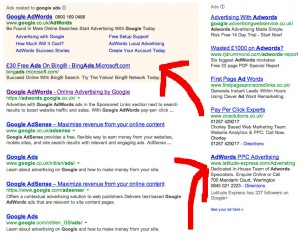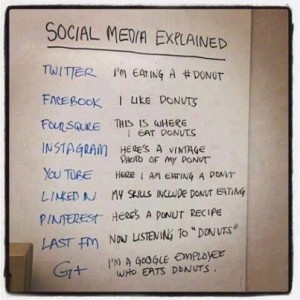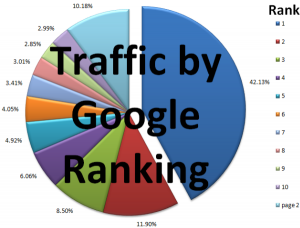Marketing Ideas: A Digital Introduction
“Digital Marketing” – I find there is confusion when talking to clients about these 2 words. This is partly as they are concentrating running their own business and not keeping up with the trends of digital and the world of the internet, plus the newness and speed of the sector. A lot of business owners don’t know where to start when it comes to marketing their business on the internet, what approaches to take/try that will give them a good ROI.
The dictionary defines marketing as: “the total of activities involved in the transfer of goods from the producer or seller to the consumeror buyer, including advertising, shipping, storing, and selling.”
The keyword is “digital” which in this case means promoting your business online instead of offline.
Starting Point?
A lot of businesses have this question. The digital marketing world is so vast and filled with information that is ever expanding that it feels like a vast ocean of information. So lets dive into it:
Firstly your business MUST have a website. This is your “digital shop window” that acts as a hub for your products/services. It is the gateways to your marketing activities online.
To organise the marketing methods I am going to use Speed of Implementation. By this I mean how fast does it take to get some sort of results from the marketing method used.
Adverts
The starting point for these is usually Google Ads, Bing Ads and Yahoo! Ads. The way that they work is that you select some keywords either that you have in mind and/or using the keyword tool to uncover search volume, competition and an estimated Cost Per Click. Once you have selected your keywords, you then create a campaign using them and you then bid on the keywords by entering an amount you are willing to pay for every click generated. This means that every time a prospective customer clicks on the advert, they get taken to your website and you pay £xx.xx. There are other factors involved in using PPC ads, but they are for advanced users. The adverts look a little like this: (the red arrows point to the ads)

The results:
They are usually very quick as once you have created your campaign and placed your bids for the keywords you have selected and completed the campaign, Google and other search engines will place your ads live on their SERPs (Search Engine Results Pages). This means that (depending on the time of day etc) your ads will receive clicks and you can gather some data about the Click Through Rates, Cost Per Clicks and Conversions using Analytics tools. You can then use this data to see whether an ad is worth pursuing or abandoning.
Key Tips:
Always be optimising your adverts. Write 2-3 versions of the same advert and see which one performs the best. Then attempt to beat it by writing another 2-3 versions of the best performing ad. (remember your budget) Create different landing pages for your ads. You might be targeting a keyword that when clicked on points to a page on your website that has no relevance with the keyword you have targeted.
Social Media
Social Media Marketing is the digital “word-of-mouth”. Using social networking sites like Facebook, Twitter, Google+, LinkedIn, YouTube etc have each got their benefits depending on how you use the platform and whether you are using it for what it was designed for. Below is a “sort-of” description on what each social platform does and what you should use it for.
 Social Media can be a great way to actually connect with your audience and share your experiences with them as well as listening to your customer’s needs and become more “personal”. In essence, a company with a “face”.
Social Media can be a great way to actually connect with your audience and share your experiences with them as well as listening to your customer’s needs and become more “personal”. In essence, a company with a “face”.
It does take time and work (like all things) but if you succeed in promoting your material and then it goes “viral“, your business will have succeeded in building its online brand and community.
Key Tip:
Make sure your business has social media accounts, but also make sure you have personal accounts of employees/owners of the business to show that there is a “face” behind the business. This builds an element of trust which leads to click encouragement and share-ability.
Email Marketing
Marketing through email is still a very powerful marketing method used by virtually all online businesses. Next time you shop using an online store, notice at the end when it comes to the payment there is usually a little box that is ticked that says something like “tick this to get subscribed onto our mailing list/newsletter”. Why do you think this happens? It all comes down to acquiring costs and ROI (isn’t all marketing?).
The cost to acquire a visitor to your website maybe say £1 (through your various marketing channels). If that visitor leaves without performing some sort of desired action (a purchase would be nice) then you may have lost him for good and might as well put the pound coin in the bin. However, if you offer something of value to that visitor (like a discount or a free ebook on something to do with the industry you are in) in exchange for their email address, then they are more likely to give it to you. This means you haven’t wasted your £1 on your visitor as you have retained some sort of information from them whereby you can always send them an email with a link to your website which means they are more likely to visit again.
“The money is in the list”. By building a list, I mean build a list of targeted leads that are people who are interested in what you have to offer but have not reached the end of their “buying cycle”.
Key Tip:
Find your USP (Unique Selling Point) and “marry” it with the “pains” in your industry to produce a document that people actually are interested in reading. This will generate higher subscriptions which leads to trust and branding, which then leads to more purchases.
Search Engine Optimisation (SEO)
SEO is probably one of the most used marketing methods online and one of the most powerful ones. It is the process of ranking your website as high as possible in the Search Engine Results Pages (SERPs). It can be a lengthy process depending on the keyword(s) you are targeting and their competition levels. It is more of a long term investment as rankings can sometimes take months.
In particular Google is where businesses want their websites to be ranking high. Google is one of the 3 main search engines (Google, Bing, Yahoo!) and has the largest market share out of the 3 (about 67%). This means that Google sends a ton of traffic to your website if you are ranking high in its pages.
The statistics are:
 This shows that if you are NOT ranked on the 1st page, the amount of traffic you will get is very small. The reason for this is “real-estate” or location. In terms of a property being in the centre of a city will be worth more and get more viewings than a property that is in the countryside. So the mission by any business should be a number 1 position for their target keywords on Google.
This shows that if you are NOT ranked on the 1st page, the amount of traffic you will get is very small. The reason for this is “real-estate” or location. In terms of a property being in the centre of a city will be worth more and get more viewings than a property that is in the countryside. So the mission by any business should be a number 1 position for their target keywords on Google.
Key Tip:
Make sure that you don’t look just for the cheapest price. Your budget and money is important, but the saying of “you get what you pay for” definitely applies here. You could do more harm than good with a cheap SEO campaign as Google changes their algorithms very frequently and if your site is found to be performing “bad” or “spammy” SEO, it could get penalised and worse still, taken off Google’s index entirely.
This post is getting quite lengthy now so I will leave it down to you. What are your thoughts/opinions? Do you have anything of value to add?
